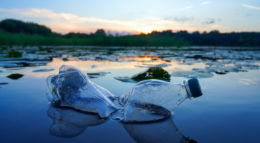
We need more movements like Plastic Free July
We need movements like Plastic Free July to act as a catalyst for continued and sustained change, argues Guy Schanschieff.
Plastic pollution has now become one of the most pressing global environmental issues that we face today. Over the past decade we have seen single-use plastics explode to the point where the production of disposable plastic now outweighs the world's ability to deal with it. It is clear that whilst there have been steps by governments to curb the use of single-use plastics in recent years, time is running out and if we do not act now plastic pollution will be with us seemingly forever.
Last month saw Plastic Free July take place – a global movement calling on people to ditch single-use plastics and work to become part of the solution. This year saw over 300 million people take part in the campaign to do their part in reducing our plastic use and we can continue this trajectory for years to come. Whilst this is brilliant and a great step in the right direction, it is important that this battle does not fall solely on the shoulders of consumers – businesses have a very big role to play in reducing plastics and innovating to create more sustainable products across their supply chains.
We need movements such as Plastic Free July to serve as a catalyst for everyone to change their habits around the use of plastics – and not just because of the visible damage (80 per cent of all ocean waste consists of plastic) but to curb the effects that are not always visible to us. We need to shine a light on the fact that much of the plastic pollution ends up in developing nations that do not have effective ways to dispose of it, and one of the only options available is burning it.
Take the example of single-use nappies. Disposable plastic nappies currently account for 30 per cent of the world's non-biodegradable waste, with nappies being the third biggest contributor to landfill. This is not only having a major environmental impact, but also a huge waste disposal issue for governments and authorities around the world.
As a result, single-use nappies have a direct effect on climate change as they are thrown away in landfills and often incinerated which produces greenhouse gases like methane, as well as carbon dioxide emissions which pollute our air. The energy cost of single-use items is extremely detrimental to our planet.
Whilst that may seem like a negative outlook, there is hope as small changes can go a long way. For example, 8 million disposable nappies are thrown into landfill every day in the UK equating to 3 billion a year – these take about 500 years to decompose with 8 per cent of UK household waste coming from plastic nappies. Switching to reusable nappies will reduce this number significantly and it's not just true for nappies but for a range of single-use plastic products which now have sustainable alternatives.
Often plastic pollution and the climate crisis are looked at in silo but this needs to stop as they are part of the same problem. Awareness has been raised of both, but we really need to see actionable steps come next – from both governments and businesses.
Alongside Plastic Free July, last month also saw Climate Week take place here in the UK – resulting in John Kerry's visit to the UK as the US' Special Envoy. He further emphasised the need for urgent change in our environmental habits, calling out the international community's lack of urgency in addressing climate issues and highlighted that we need to do more to cut planet-warming greenhouse gas emissions and work to reduce emissions significantly enough between 2020 and 2030 so that we keep alive the limit on the Earth's temperature rise. One way to do this is to reduce our use of plastic.
In addition to this, the current Environment Bill making the rounds in UK parliament is another step in the right direction and a way we can show our commitment in reducing our single-plastic use. However, an amendment to the bill is desperately needed to address the real solution at hand which is to end our reliance on single-use plastic.
Whilst we know that governments are working to address these issues, we cannot wait for them. Businesses need to step up. The biggest change to our environment will come from business and looking at whether products are in line with sustainability goals. Changes will need to be made, not only in manufacturing and development but also in marketing and communications.
Any business that says they are doing enough is not telling the truth, we can all always be doing more. Until we are able to be proud of the way the globe is heading from achieving net zero emissions to reducing plastic waste all around – we need to actively be concerned about our planet.
Understandably, the pandemic has made it more challenging for families to concentrate on reducing their single plastic use, but this Plastic Free July can serve as a reminder that we still need to do what we can. Plastic remains one of our biggest environmental challenges, but with just under 10 years to go until we need to meet our UN 2030 SDG goals, we have a lot more to do to make necessary progress.















